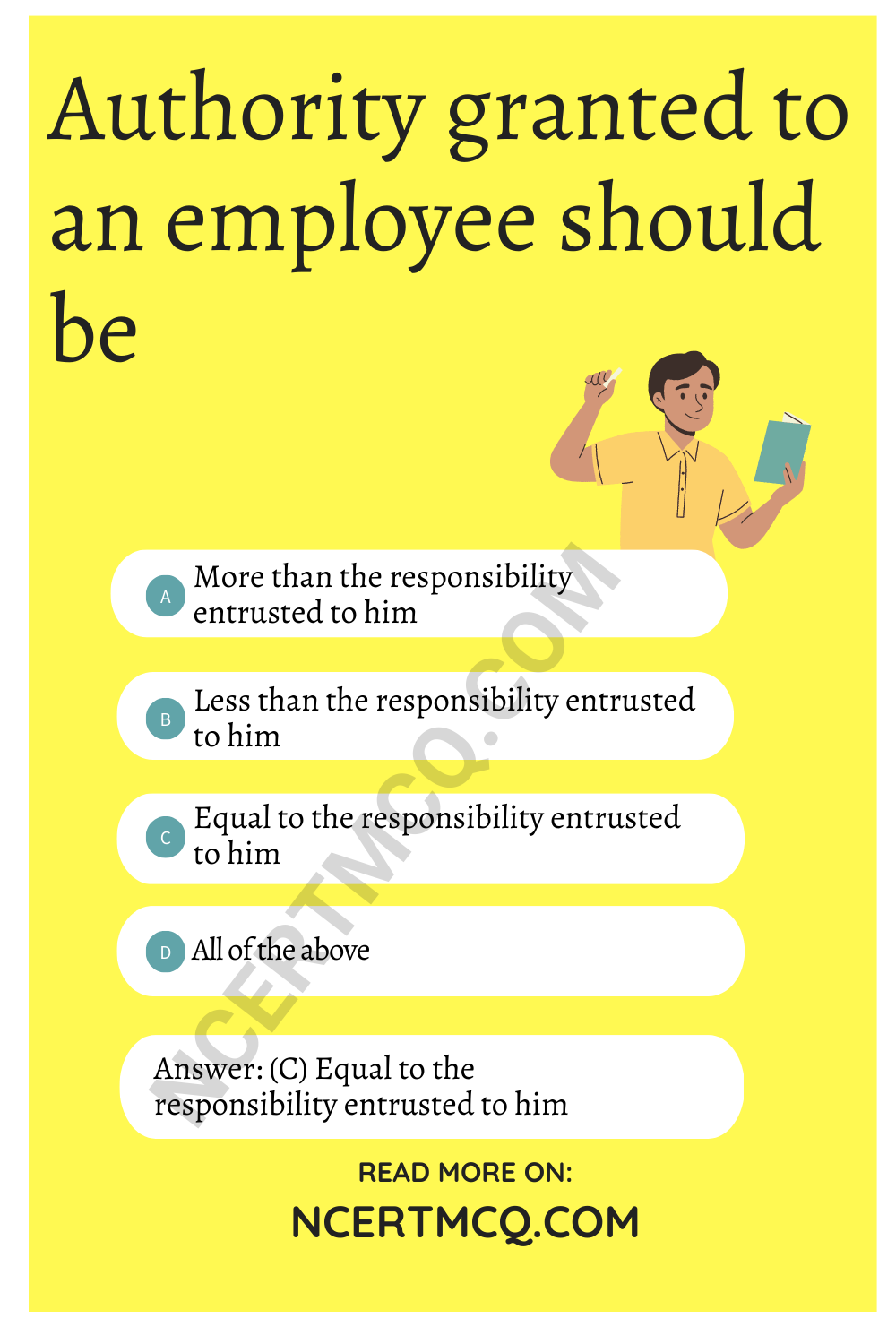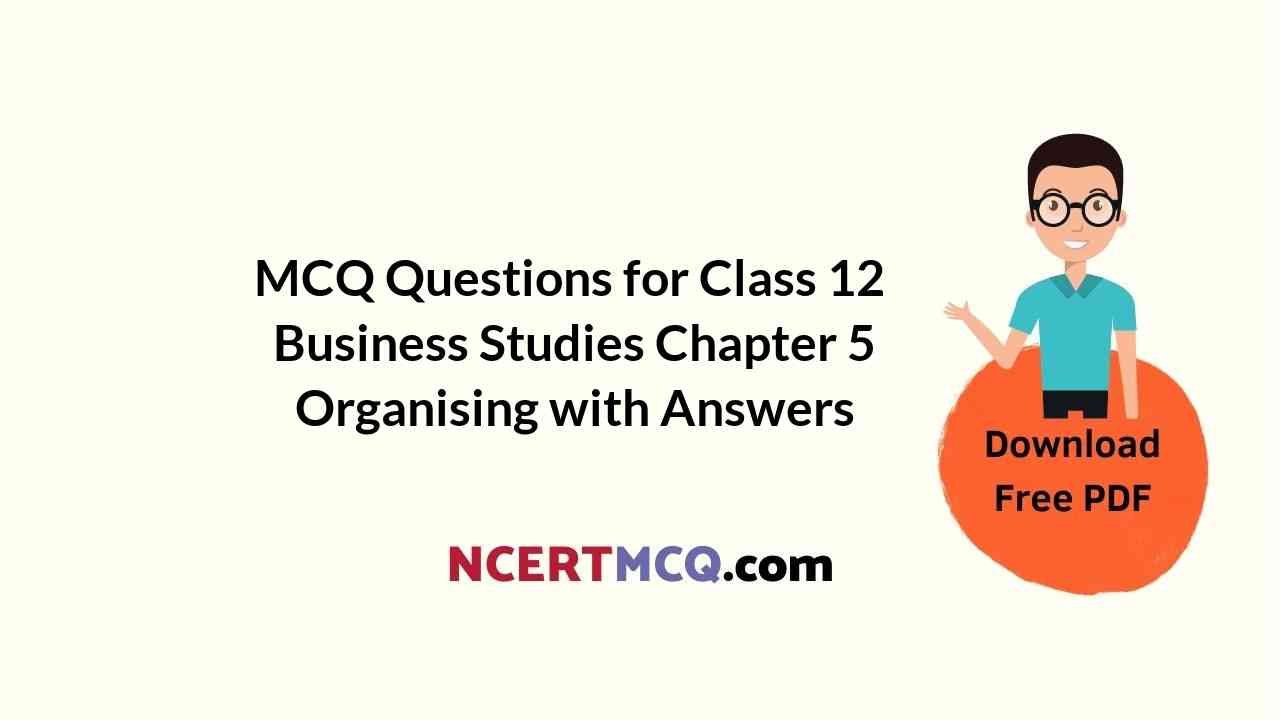Check the below NCERT MCQ Questions for Class 12 Business Studies Chapter 5 Organising with Answers Pdf free download. MCQ Questions for Class 12 Business Studies with Answers were prepared based on the latest exam pattern. We have provided Organising Class 12 Business Studies MCQs Questions with Answers to help students understand the concept very well.
Class 12 Business Studies Chapter 5 Organising MCQ With Answers
Business Studies Class 12 Chapter 5 MCQs On Organising
Organising Class 12 MCQ Question 1.
Organising process includes one of the following:
(a) Grouping of activities
(b) Prescribing disciplinary action
(c) Determining objectives
(d) Prescribing work schedule
Answer
Answer: (a) Grouping of activities
Organizing Includes MCQ Question 2.
One of the following is not an importance of organising:
(a) Role clarity
(b) Performance appraisal
(c) Adaptation to change
(d) Growth and expansion
Answer
Answer: (b) Performance appraisal
Organising MCQ Question 3.
Organisation structure establishes relationships between
(a) organisation and environment.
(b) people, work and resources.
(c) organisation and society.
(d) suppliers and customers.
Answer
Answer: (b) people, work and resources.
Organising MCQ Class 12 Question 4.
One of the following is an advantage of functional structure:
(a) Responsibility for end results
(b) Flexibility
(c) Personalised attention
(d) Easier employee learning
Answer
Answer: (d) Easier employee learning

MCQ Of Organising Class 12 Question 5.
Divisional structure leads to conflict in
(a) resource allocation.
(b) marketing management.
(c) motivation.
(d) planning process.
Answer
Answer: (a) resource allocation.
Question 6.
In which respect does formal organisation differ from informal organisation?
(a) Production process
(b) Structuring
(c) Financial procedure
(d) Purchasing
Answer
Answer: (b) Structuring
Question 7.
Which one of the following does not follow scalar chain?
(a) Informal organisation
(b) Functional structure
(c) Formal organisation
(d) Divisional structure
Answer
Answer: (a) Informal organisation
Question 8.
Degree of decentralisation indicates
(a) degree of authority delegation.
(b) degree of responsibility.
(c) degree of power delegation.
(d) degree of accountability.
Answer
Answer: (a) degree of authority delegation.
Question 9.
___ involves giving authority and responsibility to subordinates.
(a) Division of work
(b) Decentralisation
(c) Delegation
(d) Centralisation
Answer
Answer: (c) Delegation
Question 10.
___ is the process of grouting similar activities together and creating departments.
(a) Division of work
(b) Departmentalisation
(c) Delegation
(d) Centralisation
Answer
Answer: (b) Departmentalisation
Question 11.
___ is the organisational structure in which activities are grouped on the basis of products.
(a) Divisional structure
(b) Functional structure
(c) Formal
(d) Informal
Answer
Answer: (a) Divisional structure
Question 12.
__ is the organisational structure in which no department is responsible for end results.
(a) Divisional structure
(b) Functional structure
(c) Formal
(d) Informal
Answer
Answer: (b) Functional structure
Question 13.
___ is the duty for job performance.
(a) Authority
(b) Responsibility
(c) Accountability
(d) Both(a) and(c)
Answer
Answer: (b) Responsibility
Question 14.
___ is the right to command.
(a) Authority
(b) Responsibility
(c) Accountability
(d) Both (b) and (c)
Answer
Answer: (a) Authority
Question 15.
___ cannot be delegated.
(a) Authority
(b) Responsibility
(c) Accountability
(d) Both (a) and (b)
Answer
Answer: (c) Accountability
Question 16.
When decision-making authority is retained organisation is said to be by higher management levels, an
(a) Decentralised
(b) Centralised
(c) Fragmented
(d) None of the above
Answer
Answer: (b) Centralised
Question 17.
Responsibility is derived from
(a) Authority
(b)Formal position
(c) Accountability
(d) All of the above
Answer
Answer: (a) Authority
Question 18.
Which of the following cannot be delegated?
(a) Responsibility and accountability
(b) Authority and responsibility
(c) Accountability and responsibility
(d) All of the above
Answer
Answer: (a) Responsibility and accountability
Question 19.
The accountability flows
(a) In all directions
(b) Downwards
(c) Upwards
(d) None of the above
Answer
Answer: (c) Upwards
Explanation:
a subordinate is accountable to his superior
Question 20.
Authority granted to an employee should be
(a) More than the responsibility entrusted to him
(b) Less than the responsibility entrusted to him
(c) Equal to the responsibility entrusted to him
(d) All of the above
Answer
Answer: (c) Equal to the responsibility entrusted to him

True or False
State with reasons whether the following statements are True or False.
1. Delegation is the step of organising process through which departments and sections in an organisation are created.
Answer
Answer: False; departmentalisation is the step.
2. Divisional structure is the aspect of organising that establishes relationships between people, work and resources.
Answer
Answer: False; organisation structure is the aspect of organising.
3. Formal organisational structure is consciously and deliberately designed structure of well-defined jobs.
Answer
Answer: True; formal organisational structure is consciously and deliberately designed structure of well-defined jobs, each bearing a definite authority, responsibility and accountability.
4. Responsibility cannot be delegated at all.
Answer
Answer: False; accountability cannot be delegated at all.
5. Responsibility is the duty for job performance.
Answer
Answer: True; it originates from delegated authority.
6. Accountability originates from delegated authority.
Answer
Answer: False; responsibility originates from delegated authority.
We hope the given NCERT MCQ Questions for Class 12 Business Studies Chapter 5 Organising with Answers Pdf free download will help you. If you have any queries regarding Organising CBSE Class 12 Business Studies MCQs Multiple Choice Questions with Answers, drop a comment below and we will get back to you soon.
Class 12 Business Studies MCQ:
- Nature and Significance of Management Class 12 MCQ
- Principles of Management Class 12 MCQ
- Business Environment Class 12 MCQ
- Planning Class 12 MCQ
- Organising Class 12 MCQ
- Staffing Class 12 MCQ
- Directing Class 12 MCQ
- Controlling Class 12 MCQ
- Financial Management Class 12 MCQ
- Financial Markets Class 12 MCQ
- Marketing Management Class 12 MCQ
- Consumer Protection Class 12 MCQ
- Entrepreneurship Development Class 12 MCQ
